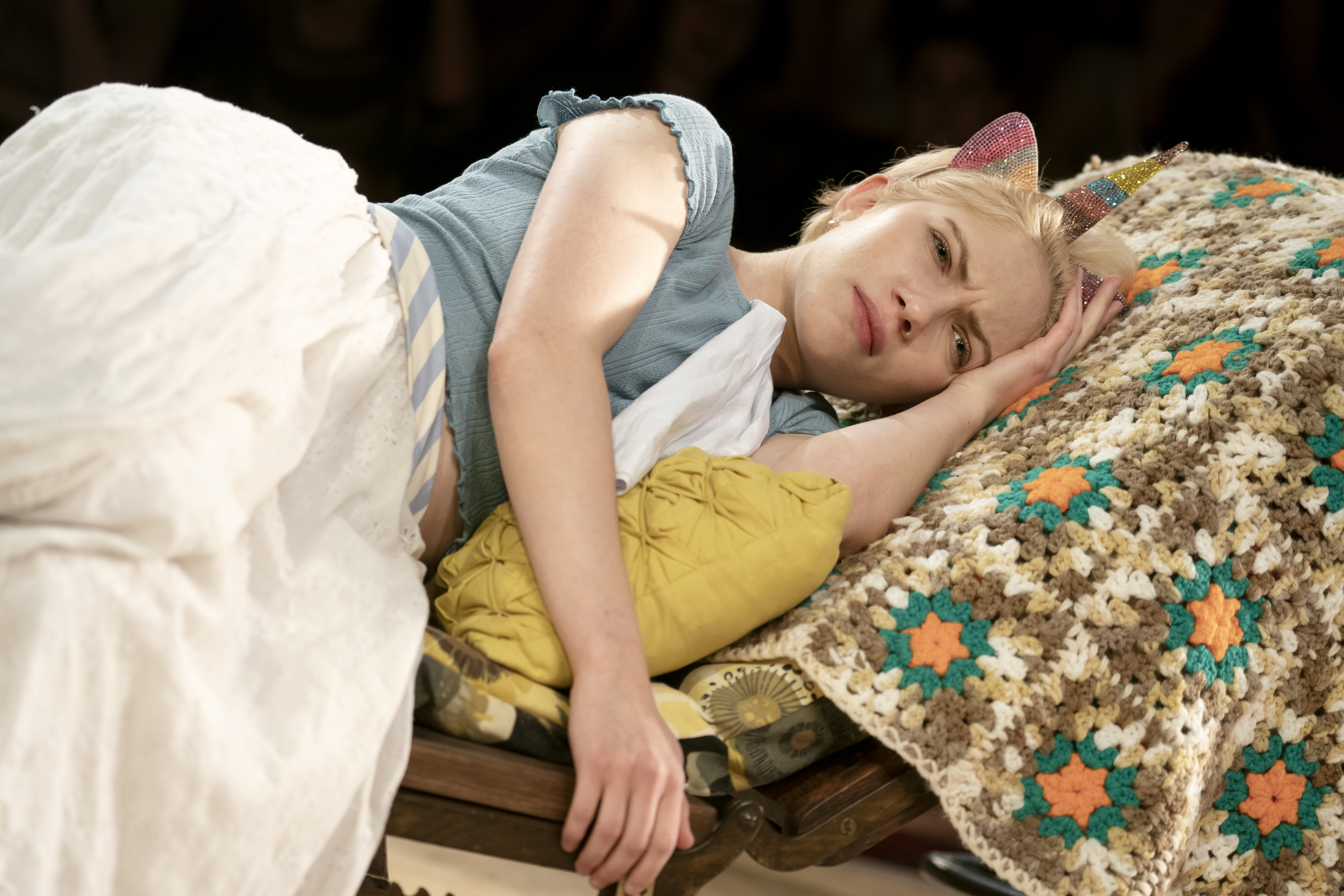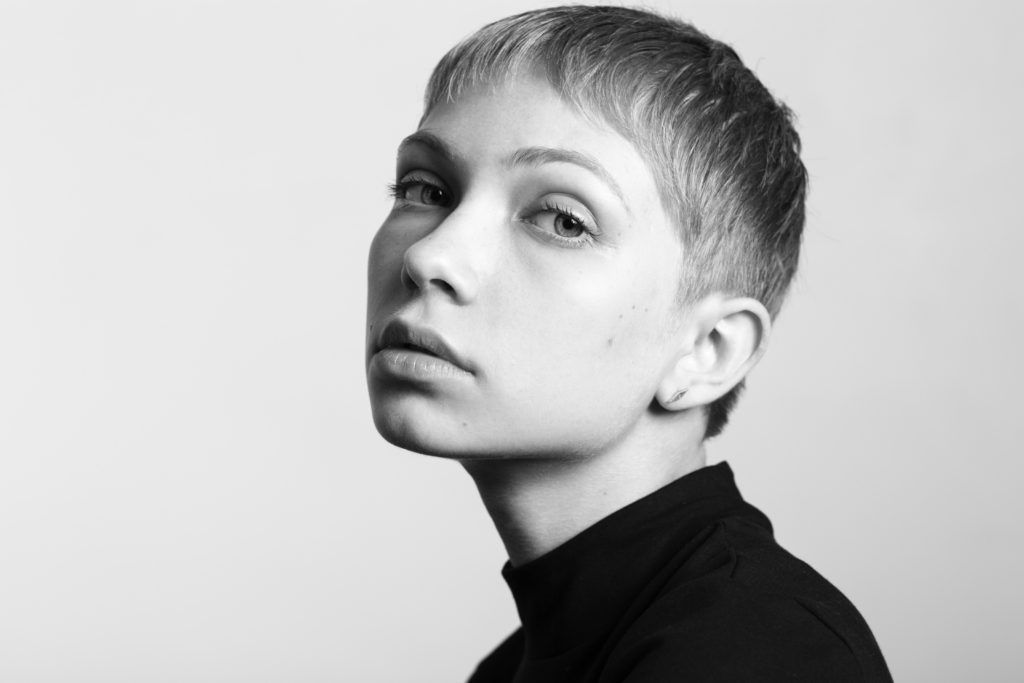Since folding “Rookie,” the online magazine she founded, Tavi Gevinson has firmly established herself as an NYC stage actress. She’s currently starring in “Moscow Moscow Moscow Moscow Moscow Moscow,” playwright Halley Feiffer’s reimagined version of Anton Chekhov’s “Three Sisters,” at NYC’s MCC Theater. Gevinson plays sister Irina opposite Rebecca Henderson’s Olga and Chris Perfetti’s Masha.
Gevinson last appeared onstage in “Days of Rage” at Second Stage Theater. She’s also acted in productions of “The Cherry Orchard” “This Is Our Youth,” “The Crucible,” and “The Member of the Wedding.” Her screen credits include “Enough Said,” “Person to Person,” “Parenthood,” and “Scream Queens.”
Women and Hollywood spoke to Gevinson about “Moscow Moscow Moscow Moscow Moscow Moscow,” translating Chekhov for 2019, and how audiences have been responding to the play.
“Moscow Moscow Moscow Moscow Moscow Moscow” will run at MCC Theater through August 17. It is being presented in association with Williamstown Theatre Festival.
W&H: How has the transition been for you going from editorial to acting?
TG: Really interesting. All of the qualities that I thought I had to mute or censor within myself that came from being an editor and come with being a writer, being analytical or opinionated, are always with me on a new acting project. I really like being able to surrender to someone else’s vision and not have to just do an actor’s job. I’ve always been very pleased to work with people who are really collaborative and didn’t make me feel like I didn’t have a voice in the room. Not to say that actors are just actors, but some playwrights or directors might see actors as obstacles to work around or dolls. [Director Trip Cullman] and Halley [Feiffer] are both very collaborative and open. It’s been very pleasant to learn that the things I thought I had to keep in check are actually very welcome in a process like this one.
W&H: Do you lean towards period pieces or people that you want to work with when choosing plays?
TG: I’m open to everything and these are the jobs that have ended up working out. It wasn’t anything I have ever set my sights on. “The Crucible” was directed by Ivo van Hove and the set was quite minimalist. He told us the play was set somewhat out of time or place and is a political allegory. We talked a lot about Salem and the trials. He didn’t want people to look at it as a period piece or reenactment.
I think I have been lucky to have gotten to do these takes. With “Moscow,” Halley was also very specific that the story takes place in Russia in 1908, but they’re talking the way people talk now as if it’s a translation.
W&H: What’s it like to be working on a Chekhov play in 2019?
TG: I liked this play because I felt like Halley saw things I loved about Chekhov that feel relevant to today that I couldn’t find in many translations. It’s also very true to the time period. I haven’t had time to see many Chekhov productions, but I understand all of the subtext and psychology in this play. When I first read it, I thought that these were all things people my age would find funny, even though most of them are written as comedies except for “Three Sisters.” People just don’t think of Chekhov’s plays as funny.

Gevinson in “Moscow Moscow Moscow Moscow Moscow Moscow”: Joan Marcus
W&H: Did you do research into the particular period this play is set in?
TG: When we did this play in Williamstown, I read a book of interviews with actors who had performed Chekhov in Williamstown [“The Actor’s Chekhov”]. There was an interview with John Glover, who I was in a production of “The Cherry Orchard” with a few years ago. He said that people discover the subtext in a Chekhov play and realize the characters are referring to death or tragedy. Then they play the whole thing sad and slow, which is a kind of trap.
W&H: What do you think of the adaptation of the play?
TG: I love how Halley made all of the subtext text and infused it with this energy and the way people speak. It reminds me a lot, in the earlier acts, of how people talk that I know, trying to bat away pain through humor and irony. It also reminded me a lot of how people talk online. When I look at my Twitter feed, I see sardonic tweets about how much people hate their lives, for example, and their tone is so detached. For me, part of the pleasure of doing this play now is that the language onstage feels seamless from the way people learn to express themselves online, either detached or as a defense mechanism.
W&H: The show has been incredibly successful and has been extended over at the MCC Theater. What do you attribute that success to and is it attracting the millennial audience the producers had hoped it would?
TG: I think the show plays really well among people who are studying theater, and those who probably very recently read Chekhov and “Three Sisters.” I’ve had family or family friends who are older come [to the show] and I’ll tell them that the audience was really quiet tonight and that it was an older crowd. They have told me that the characters are so clearly in pain that it’s not that funny. I think if it’s your sense of humor, then you laugh out loud. If it’s not how you talk and how your friends talk, it is alarming how cruel the characters actually are even if it’s cloaked in all this humor and brattiness.
The play is also 90 minutes and starts in a place that’s very heightened and goes somewhere else. The fact that we are able to drive from one point to another straight through and take people on that ride without stopping has probably made the tone, concept, and storytelling effective. I think that’s why people have enjoyed it enough for us to get another few weeks in our run.
W&H: What has the general response to the show been like?
TG: One of the first things people comment on when they see the show is that the cast is like a 12-headed monster and that we are all very in sync. It’s kind of thrilling to watch a cast like that. The last few shows I saw were “Fairview” [at Soho Rep.] and “A Strange Loop” [at Playwrights Horizons,] and they both have ensembles that are so tight. I don’t know what it’s like from the outside of our show, but it has just been amazing to see something that just happens this rapidly.
W&H: Is that largely due to the play’s direction?
TG: Yes, one day during previews, Trip had us do an Italian speed-through for pragmatic reasons, mainly for the sake of time. We did the first act that way and he decided that was how the show should feel. He would say that Halley’s writing is very rhythmic. It tells you what it needs to be while you are reading it. Even when we did table reads, it was clear how everything was supposed to land. She’s very specific about caps and punctuation and how long you say a word.
W&H: Are there any playwrights or directors that you’ve worked with or would like to work with in the future?
TG: There are plenty. Lila Neuberger is amazing. I’ve gotten to work before with Gaye Taylor Upchurch and Anna Davida Shapiro, who are great. I’m a big fan of Annie Baker. Jackie Sibblies Drury wrote “Fairview,” which was one of the most exciting theater experiences I’ve had in a long time. Lynn Nottage is someone else I’d like to work with in the future.
W&H: You’ve also worked in TV and film. Is there a medium that you prefer?
TG: I like them all. They’re all different skills. I’ve done theater the most. I love the routine and having my life here [in NYC] and being able to do the show each night. I also love the family that comes out of that repetition. You get that on a set, too. I’m just not as accustomed to that. I’m an avid consumer of both.







